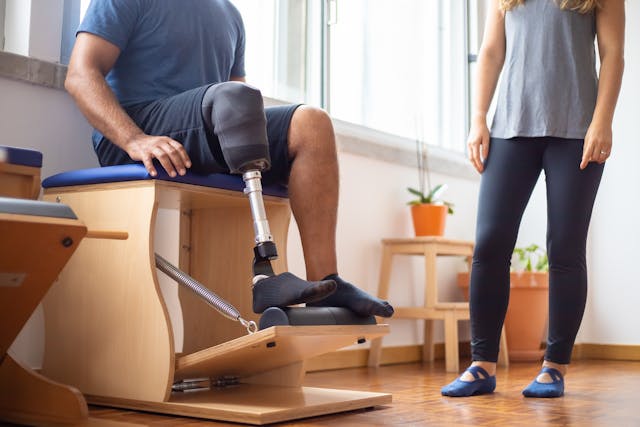Every child deserves a school environment where they feel safe, confident, and included. For children with prosthetic limbs, school life can come with unique challenges—both physical and emotional. While some children adapt easily, others may need extra support from teachers, classmates, and school staff to feel comfortable and fully participate in activities.
The good news is that schools can make a huge difference. By creating an inclusive, understanding, and accessible environment, educators can help children with prosthetic limbs thrive both academically and socially. In this article, we will explore practical ways schools can support these children, from classroom adaptations to emotional encouragement and peer inclusion.
Let’s dive in.
1. Creating an Accessible School Environment
The first step in supporting children with prosthetic limbs is ensuring the school environment is physically accessible. This means making sure classrooms, playgrounds, and other facilities are designed in a way that allows every child to move freely and safely.
Hallways and doorways should be wide enough for children with prosthetic limbs to navigate comfortably. If the school has stairs, ramps and elevators should be available as alternatives. Uneven surfaces or slippery floors can make walking difficult, so regular maintenance is important to ensure a safe environment.
Desks and seating arrangements should also be flexible. Some children with prosthetic arms may need more space to move freely, while those with prosthetic legs may require seating that supports a comfortable posture. Schools can work with students and their parents to identify any necessary modifications to create a learning space that suits their needs.
2. Training Teachers and Staff for Better Support
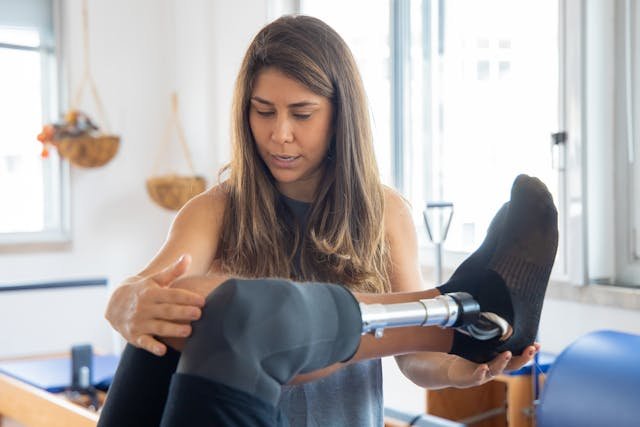
Teachers play a critical role in shaping a child’s school experience. When they are knowledgeable about prosthetics, they can offer the right kind of support and encouragement to students with limb differences.
Schools should provide training for teachers and staff on how prosthetic limbs work and what challenges children might face. This will help educators understand mobility concerns, activity limitations, and potential adjustments that can make learning easier for the child. Simple things like allowing extra time for certain tasks or recognizing signs of discomfort can make a big difference.
Beyond physical support, emotional understanding is just as important. Teachers should be aware of the social and emotional struggles some children may experience. Encouraging open conversations and creating a positive classroom atmosphere can help children with prosthetic limbs feel accepted and confident.
3. Encouraging Peer Inclusion and Awareness
A big part of a child’s school experience is social interaction. Friendships, group activities, and playtime are essential for emotional growth. However, children with prosthetic limbs may sometimes feel different from their peers, leading to feelings of isolation. Schools can take steps to prevent this and foster inclusion.
One of the best ways to build understanding is through awareness programs. Teachers can educate students about prosthetic limbs in a simple and engaging way. This helps reduce curiosity-driven questions and prevents misunderstandings that could lead to teasing or exclusion. When classmates understand prosthetics, they are more likely to treat their peers with kindness and acceptance.
Schools can also create buddy systems, where students are paired with classmates who can offer support and friendship. Encouraging teamwork in group projects and physical activities ensures that children with prosthetic limbs are fully included in school life. The goal is to create a culture of acceptance where all children feel valued.
4. Adapting Physical Education and Extracurricular Activities
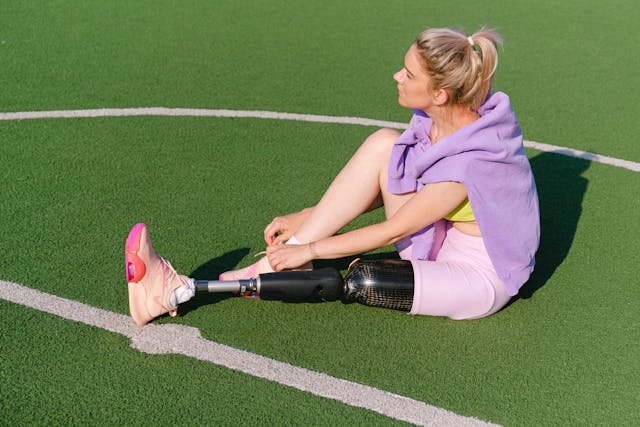
Physical activity is crucial for every child, including those with prosthetic limbs. However, traditional physical education (PE) classes may not always be designed with accessibility in mind. Schools must take steps to ensure that children with prosthetics can participate in sports and activities safely and comfortably.
PE teachers should work closely with students to understand their abilities and limitations. Some children may need modifications, such as using adaptive sports equipment or different warm-up routines to prevent strain. Offering a variety of activities ensures that every child can find something they enjoy, whether it’s running, swimming, or playing a team sport.
Extracurricular activities should also be inclusive. Art, music, and drama programs should be designed to accommodate all students, regardless of physical ability. When children with prosthetic limbs are encouraged to take part in creative and athletic pursuits, it boosts their confidence and helps them feel like they truly belong.
5. Providing Emotional Support and Building Confidence
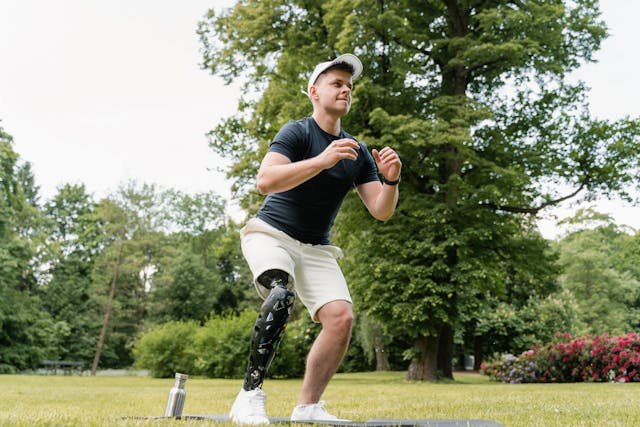
Adjusting to life with a prosthetic limb can be challenging, especially in a school setting where children are naturally curious. Some students may feel self-conscious or worry about being treated differently. This is where emotional support from teachers, counselors, and peers becomes essential.
School counselors should be available to talk to students who may need help adjusting emotionally. Some children may feel frustrated by physical limitations, while others might struggle with body image or social anxiety. Having a trusted adult to talk to can provide reassurance and help children build confidence.
Encouraging self-advocacy is another important step. Children should feel comfortable expressing their needs and asking for support when necessary. Teachers can help by fostering open communication, listening to concerns, and reinforcing the idea that every child has unique strengths and challenges.
6. Working with Parents for a Supportive School Experience
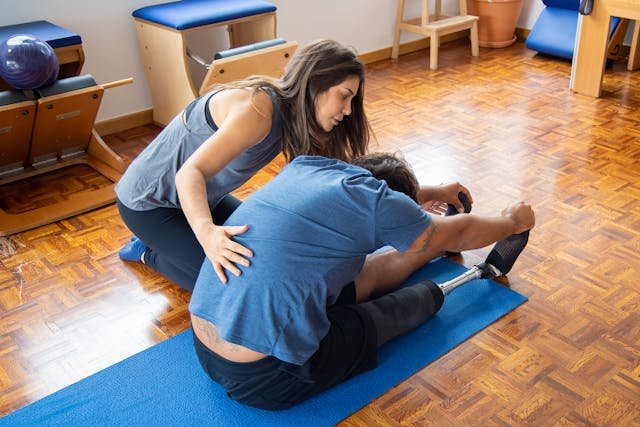
Parents play a key role in ensuring their child’s school experience is positive and enriching. Schools should maintain open communication with families to better understand the specific needs of each child. Regular meetings with parents can help educators stay informed about medical updates, necessary adjustments, or any concerns the child might have.
Parents can also help by sharing insights on how their child interacts best in different environments. Whether it’s understanding fatigue levels, preferred seating arrangements, or strategies for social interactions, this information can help schools create a supportive learning atmosphere.
Collaboration between parents and teachers can also extend to social activities. Schools can invite parents to speak about their child’s journey, helping classmates develop empathy and understanding. The more children and parents are involved in discussions about inclusion, the more natural and accepting the school environment becomes.
7. Promoting a Positive Mindset Towards Differences
One of the most powerful ways schools can support children with prosthetic limbs is by creating a culture that celebrates differences rather than focusing on limitations. When diversity is embraced, all students—regardless of their abilities—feel valued and included.
Teachers can integrate discussions about disability and inclusivity into their lessons. Reading books or showing videos that feature characters with prosthetic limbs can help normalize the experience. When children see positive representations of people like them, it reinforces self-acceptance and self-worth.
Celebrating achievements is also important. Recognizing a child’s efforts—whether in academics, sports, or social contributions—helps them feel seen and appreciated. Schools should ensure that success is defined in many ways, not just through traditional measures like physical ability or competition.
8. Using Assistive Technology to Enhance Learning
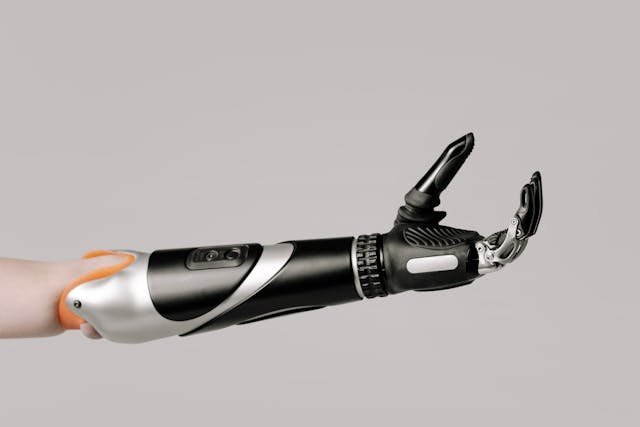
Technology is playing an increasingly important role in education, and for children with prosthetic limbs, assistive technology can make learning more accessible and engaging. Schools that integrate the right tools can help students with prosthetics participate fully in both academic and creative activities.
One of the most effective tools is voice-to-text software. Some children with upper-limb prosthetics may find writing or typing tiring, especially during long assignments. Voice recognition tools allow students to dictate their work, reducing strain and making it easier to complete tasks without frustration.
Interactive smartboards and touchscreen devices also help by making learning more hands-on. Instead of traditional methods that require fine motor skills, students can engage with lessons using touch-based technology. This is particularly helpful in subjects like math and science, where visual and interactive learning improves comprehension.
Virtual reality (VR) and augmented reality (AR) are also being used in schools to create inclusive learning experiences. These technologies allow students with prosthetics to engage in simulations, practice real-world skills, and explore environments that might otherwise be difficult to navigate. By incorporating technology into education, schools can ensure that every child has equal opportunities to succeed.
9. Addressing Bullying and Fostering a Culture of Respect
Even in the most supportive environments, children with prosthetic limbs may still face curiosity, misunderstandings, or even bullying from their peers. Schools must take an active role in creating a culture of respect to ensure that all students feel safe and valued.
The first step is educating students about differences in a way that encourages empathy. Many children may not understand what a prosthetic limb is or why someone needs one. Teachers can hold classroom discussions that normalize limb differences, answer questions in an open and honest way, and emphasize the importance of treating all classmates with kindness.
Schools should also have strict anti-bullying policies in place. If teasing or exclusion occurs, teachers must intervene quickly and address the situation. Encouraging children to stand up for their peers and practice kindness goes a long way in building an inclusive school culture.
Another powerful tool is peer mentorship. Pairing children with prosthetic limbs with supportive classmates helps build friendships and ensures they never feel alone. When students look out for one another, the entire school community becomes stronger and more inclusive.
10. Helping Children Develop Independence and Self-Advocacy
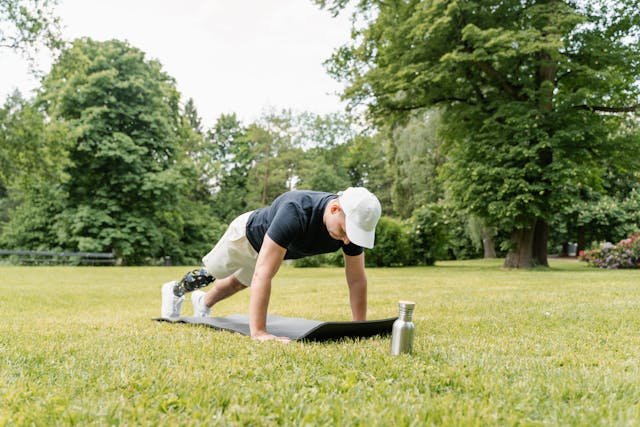
While school support is important, it’s equally crucial to empower children with prosthetic limbs to become independent and confident in advocating for their needs. Schools should encourage students to express what works best for them, whether it’s asking for help, requesting classroom modifications, or explaining their prosthetic to others.
One way to build independence is by teaching self-care routines. Some children may need to adjust their prosthetic throughout the school day, and they should feel comfortable doing so. Schools can provide private spaces where students can make adjustments if needed, ensuring they feel confident managing their prosthetic on their own.
Encouraging students to take part in leadership roles also boosts confidence. Whether it’s joining student councils, leading a group project, or participating in public speaking, these experiences help children develop a strong sense of self-worth. When children with prosthetic limbs see that they are just as capable as their peers, they gain the confidence to pursue their dreams without limitations.
11. Creating Inclusive Field Trips and Outdoor Activities
Field trips, outdoor learning experiences, and school camps are some of the most exciting parts of school life. However, for children with prosthetic limbs, these activities may come with extra challenges. Schools must ensure that every student can fully participate in these experiences.
Before planning a field trip, schools should assess accessibility. Are there ramps, smooth walking paths, and seating areas if a student needs to rest? Are there adaptive activities available if traditional ones are difficult for children with prosthetic limbs? Making these considerations ahead of time ensures a smooth experience for everyone.
Teachers should also communicate with students and parents before the trip to address any specific concerns. If a child needs additional support, the school can arrange for extra staff or make modifications to activities. Encouraging students to be part of the planning process helps them feel involved and valued.
When outdoor activities are well-planned and inclusive, children with prosthetic limbs get to enjoy the same adventures as their peers. Whether it’s visiting a science museum, going on a nature hike, or participating in a sports day, making adjustments ensures that no child is left out.
12. The Role of School Counselors in Emotional Well-Being
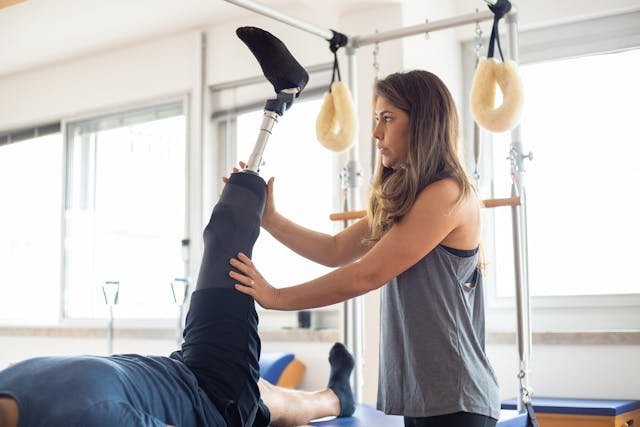
Adjusting to school life with a prosthetic limb isn’t just about physical challenges—it’s also an emotional journey. Some children may feel anxious about being different, while others may struggle with confidence or self-image. School counselors play a crucial role in helping children navigate these feelings and build resilience.
Counselors should offer one-on-one support to students who may need someone to talk to. This can help children express their feelings, overcome fears, and develop a positive outlook on their abilities. Regular check-ins ensure that any emotional struggles are addressed early on.
Group sessions and support circles can also be beneficial. Connecting with other students who face similar challenges can help children feel understood and less isolated. Schools can organize peer support groups where children share experiences, offer encouragement, and build friendships in a safe space.
Counselors should also work closely with teachers and parents to create personalized strategies that support the child’s emotional and social development. By ensuring children feel heard and supported, schools can help them grow into confident, self-assured individuals.
Final Thoughts: Creating a School Where Every Child Thrives
Supporting children with prosthetic limbs is not just about making physical adjustments—it’s about fostering an inclusive and encouraging environment where they can grow, learn, and build strong friendships. When schools take proactive steps to educate teachers, adapt activities, and promote understanding among peers, they create a space where every child feels welcome.
At Robobionics, we believe in empowering children with prosthetics to lead confident, independent lives. If you’re an educator or a parent looking for guidance on how to support a child with a prosthetic limb, reach out to us today. Together, we can build a world where every child has the opportunity to thrive.



